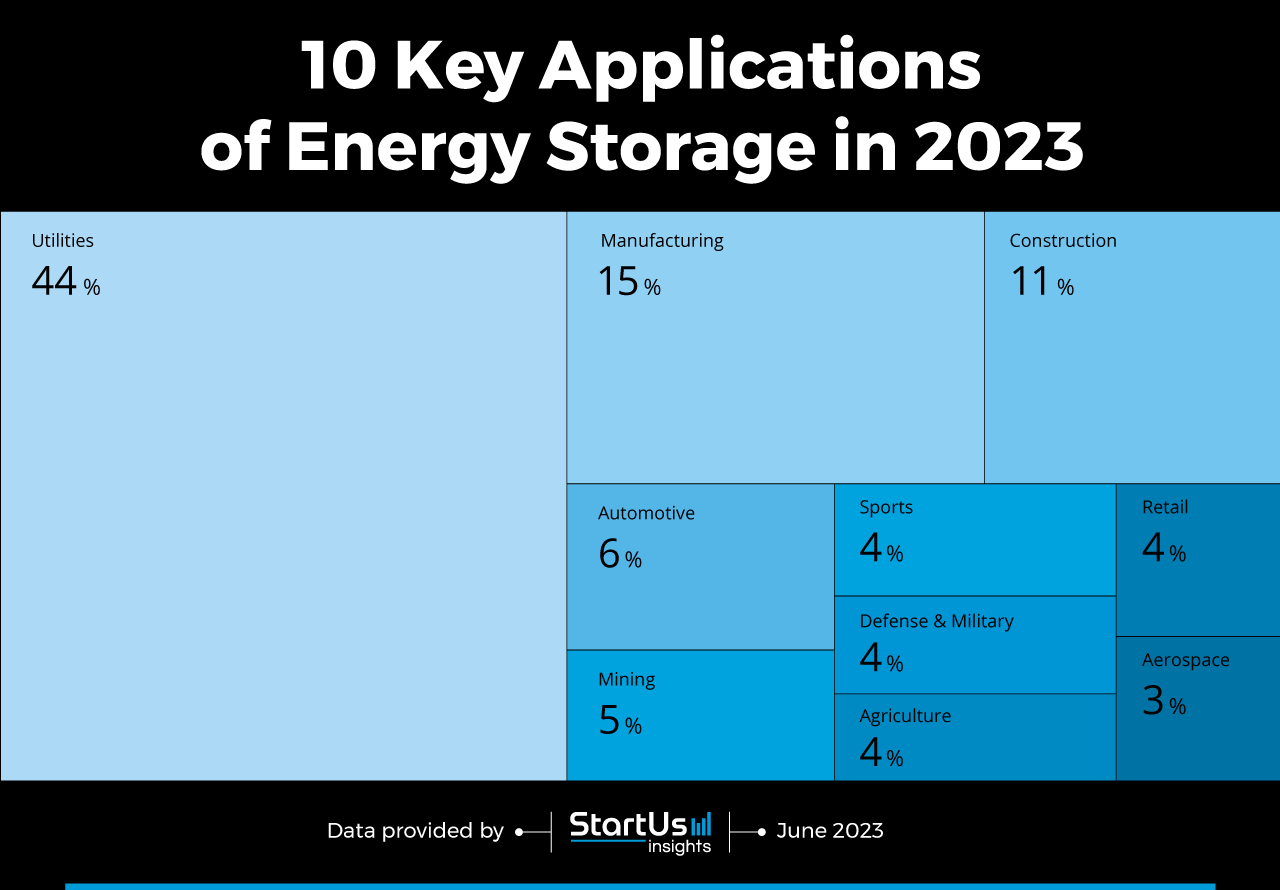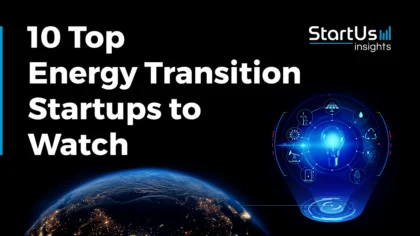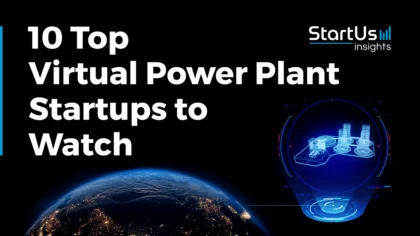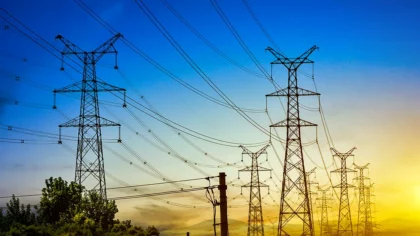Accelerate Productivity in 2025
Reignite Growth Despite the Global Slowdown
Advances in energy storage play a pivotal role in integrating renewable energy sources into the grid and ensuring a stable and reliable power supply. Companies today drive innovations in energy storage by leveraging technologies like lithium-ion batteries, flow batteries, and compressed air energy storage. Energy companies also develop scalable and cost-effective solutions to address the growing demand for energy storage across various sectors. This research focuses on critical applications of energy storage and how they advance operations in power distribution, manufacturing, construction, and more. Read more to explore all top energy storage examples and find out how you can use them.
Tree Map reveals Top 10 Energy Storage Examples across 10 Industries
The Tree Map below illustrates top energy storage applications and their impact on 10 industries in 2023 and 2024. Energy storage systems (ESS) accelerate the integration of renewable energy sources in the energy and utility sector. This improves the efficiency and reliability of power systems while providing flexibility and resilience. Utilities use energy storage to balance supply and demand, provide ancillary services, and enhance grid stability.
Manufacturing and construction industries leverage energy storage systems, like flywheels, to improve power quality and reduce reliance on fossil fuels. Mining, sports, and military sectors utilize novel energy storage systems to operate in remote or harsh environments and provide backup power. Farmers and retailers use energy storage to reduce energy costs with renewable integration and power agricultural equipment. Lastly, the automotive and aerospace industries integrate hydrogen fuel cells to power electric vehicles and aircraft, reducing emissions.
Global Startup Heat Map covers 1560 Emerging Energy Storage Companies
The Global Startup Heat Map below highlights the global distribution of the 1560 exemplary startups & scaleups that we analyzed for this research. Created through the StartUs Insights Discovery Platform that covers 3 790 000+ startups & scaleups globally, the Heat Map reveals that Western Europe has a high concentration of energy storage startups, followed by the US.
Below, you get to meet 10 out of these 1560 promising startups & scaleups as well as the solutions they develop. These energy storage startups are hand-picked based on criteria such as founding year, location, funding raised, & more. Depending on your specific needs, your top picks might look entirely different.
Top Energy Storage Use Cases across 10 Industries in 2023 & 2024
1. Utilities
Energy storage systems play a crucial role in balancing supply and demand, integrating renewable energy sources, and improving grid stability. Utilities deploy large-scale energy storage systems, such as pumped hydro storage, and compressed air energy storage (CAES). They allow energy companies to store excess energy during periods of low demand and release it during peak demand.
Energy storage also facilitates the integration of intermittent renewable energy sources like solar and wind power into the grid. In remote regions, microgrids with energy storage provide a reliable power supply and mitigate outages. Energy storage systems respond quickly to changes in grid frequency, providing grid operators with a flexible tool to ensure grid stability.
KX Power develops Utility-scale Energy Storage
KX Power is a UK-based startup that makes utility-scale renewable energy storage assets. Its battery energy storage systems (BESS) store excess electricity from renewable sources and release it when needed. KX Power also offers a data-analysis algorithm with the BESS to optimize battery economic value. This helps utilities balance the grid, reduce carbon emissions, and enable greener power generation. The startup’s utility-scale energy storage systems provide reliable, cost-effective, and sustainable energy solutions for consumer needs.
2. Manufacturing
By integrating batteries and other energy storage solutions, manufacturers are able to incorporate renewable energy sources, like solar and wind, into their facilities. This enables them to harness clean energy, reducing reliance on conventional power grids while cutting electricity expenses. Energy storage systems provide peak shaving capabilities, allowing manufacturers to optimize energy consumption during high-demand periods. This further results in substantial cost savings.
Moreover, ESS facilitates load leveling and ensures a stable and reliable power supply that safeguards manufacturing processes. These systems also serve as an uninterrupted power supply (UPS) during grid outages or voltage fluctuations, preventing downtime, equipment damage, and product losses. By leveraging these features, the manufacturing industry achieves operational efficiency and cost reduction while improving sustainability efforts.
Invinity offers a Vanadium Flow Battery
UK-based startup Invinity provides energy storage solutions for commercial, industrial, and off-grid applications. Its VS3-022 is a self-contained vanadium flow battery that uses vanadium redox flow technology. VS3-022 is a modular unit for turnkey installation, stackable for maximizing energy density, and fully scalable for specific project needs. In comparison to other energy storage technologies, the vanadium electrolyte ensures safety and stability.
It also increases the overall lifespan of the battery as the capacity does not degrade with repeated charging and discharging. Using vanadium flow batteries, Invinity enables manufacturers to store and dispatch renewable energy on demand, reducing electricity costs, improving resilience, and lowering carbon emissions.
3. Construction
Builders utilize ESS to transition to a clean, modern energy system and help reduce the industry’s carbon footprint. Construction companies integrate battery energy storage systems (BESS) into buildings and construction projects to store excess energy from renewable sources. Construction projects are increasingly incorporating smart grid technologies, enabling buildings to draw power from the grid during off-peak hours. This results in cost savings for consumers and reduced strain on the electrical grid.
Construction professionals employ thermal energy storage (TES) technologies, such as phase change materials or ice-based systems, to optimize heating and cooling systems. By storing and utilizing thermal energy when it’s most needed, TES reduces energy consumption and lowers operating costs. Battery-powered construction equipment, such as electric excavators, cranes, and trucks, are also gaining popularity and improving sustainability.
Bright Energy offers a Modular Plug-and-Play Battery
Bright Energy is a Belgian startup that provides a modular plug-and-play battery unit for the construction industry. Its plug-and-play nature allows the battery units to scale to fit the needs of any project. The built-in outlets suit multiple construction sites and, thereby, eliminate the need for additional distribution boxes to allow immediate connections.
The startup also provides an energy dashboard that simplifies the monitoring and control of individual outlet circuits. This allows the project lead to monitor, control, and optimize energy consumption on site. Bright Energy’s battery units are compact and lightweight, offering higher reliability compared to diesel generators and enabling green construction.
4. Automotive
The need for cleaner and more efficient vehicles drives innovations and applications in energy storage systems. Automotive manufacturers develop solid-state batteries for electric vehicles (EVs), offering higher energy density, faster charging, improved safety, and longer lifespan. To address concerns about charging time and limited charging infrastructure, some auto manufacturers are deploying battery-swapping stations. This approach reduces charging time and enables longer-distance travel without relying on extensive charging networks.
Companies also integrate regenerative braking systems to capture and convert the kinetic energy during braking into electrical energy. The vehicle then utilizes this energy later to power various vehicle systems or assist in acceleration. Further, newer hybrid cars use flywheel energy storage to provide quick bursts of power during acceleration. They complement traditional internal combustion engines and enhance overall power efficiency.
Li-S Energy enhances Lithium Sulfur Batteries
Australian startup Li-S Energy develops commercial lithium-sulfur and lithium metal batteries for the automotive industry. The startup embeds unique nanomaterials, boron nitride nanotubes (BNNTs), and Li-nanomesh (a proprietary nano-composite), into the cells to enhance their strength, life cycle, and performance. These batteries have twice the energy density of lithium-ion batteries, making them lighter, cleaner, and sustainable.
Lithium-sulfur batteries are lighter in weight and thus allow for longer travel distances for electric planes and EVs. Li-S Energy’s lithium metal batteries have the advantage of accommodating higher power draws, making them suitable for electric cars, scooters, and multi-prop drones. This offers EV manufacturers a competitive advantage in terms of capacity, weight, and environmental impact.
5. Mining
The mining industry has been exploring innovations in energy storage to improve efficiency, reduce costs, and minimize environmental impact. Mining teams leverage energy storage systems, such as battery banks and flywheels, to integrate renewable energy sources. This allows the industry to reduce its reliance on fossil fuels and lower emissions.
Since the mining sector is energy-intensive, energy storage also allows mines to avoid peak demand charges by using energy on demand, leading to cost savings. Load management techniques balance and stabilize energy usage to further enhance the overall efficiency of mining operations. Lastly, mining companies are upcycling abandoned mines into gravity energy systems.
Remote Energy develops a Microgrid for Mining Operations
Remote Energy is an Australian mining development startup that integrates renewable energy into mineral projects. It utilizes lithium energy storage technology to provide reliable and cost-effective power solutions for remote mining sites. The startup fits each microgrid with a propagation protection system (PPS).
This system monitors each battery module in real time for early signs of thermal runaway or fires and injects distilled water into any module that triggers the detection system. Remote Energy’s microgrid reduces the environmental impact and operational costs of mining while increasing the resilience and safety of the power supply.

6. Sports
ESS has a significant impact on the sports sector, driven by increasing concerns about climate change and customer demands. Sports stadiums are incorporating ESS to store renewable energy generated on-site, primarily from solar panels installed on the stadium roof or exterior walls. This stored energy powers various operations, including lighting, heating, and cooling, enabling stadiums to reduce their reliance on conventional power sources.
ESS also plays a crucial role in providing backup power for scoreboards and electronic displays, ensuring uninterrupted games and events. Moreover, the sports sector is embracing EVs for transportation within stadiums and complexes, with ESS facilitating the charging and management of EV fleets. By leveraging energy storage systems, sports venues contribute to a greener future for the sports industry.
Vertsun offers Photovoltaic Sports Hangar
French startup Vertsun provides photovoltaic hangars for tennis courts. It provides photovoltaic sheds for sports complexes, particularly for tennis and padel courts. The startup’s proprietary technology accommodates a large span and fewer pillars as well as features an aesthetic and slim design.
The hangars host a photovoltaic installation on the roof, which generates electricity for self-consumption or grid injection. The hangars also provide lighting, security, and fire alarm systems for the covered play areas. Vertsun’s sheds help sports facilities reduce their energy costs and environmental impacts while improving their comfort and safety.
7. Defence & Military
Energy storage systems within the defense forces and military enable operational capability enhancement, increased sustainability, and reduced logistical burdens. This leads to more efficient and effective military operations. Military research companies develop fuel cells to power lightweight, portable systems for soldiers in the field. They find use in communication devices and other mission-critical electronics.
Defense organizations are also transitioning to EVs for transportation in military bases and for external operations. Moreover, lithium-ion batteries and hydrogen fuel cells enable longer flight times and higher payload capacities for military drones. This empowers surveillance, reconnaissance, and delivery applications.
Stryten Energy provides Military-Grade Energy Storage
Stryten Energy is a US-based startup that develops Symbasys Switchpack I6T, an energy storage solution for military and government applications. It is a modular system that powers board surveillance, turret controls, targeting, communications, and other auxiliary vehicle power needs. The startup’s batteries are for combat vehicles, submarines, military communication systems, and data centers.
Stryten Energy produces lead and lithium batteries that withstand demanding environments with a silent watch capability for tactical vehicles. This reduces fuel consumption, maintenance, and logistics costs during high-risk operations. Stryten also provides smart power management and distribution technologies that maximize the availability, efficiency, and storage of electrical power. Stryten’s lithium energy storage batteries deliver enhanced platform survivability, mobility, and tactical readiness for defense use cases.
8. Agriculture
Farmers leverage energy storage systems, such as solar irrigation systems, to accommodate on-site power generation systems and reduce energy costs. The stored energy then powers irrigation or fertigation systems, reducing the reliance on grid electricity and diesel generators. Farmers also integrate lithium-ion batteries to create farm microgrids. These provide a reliable source of electricity for farms, enabling them to operate critical equipment and store produce in climate-controlled environments.
EVs such as electric tractors and harvesters reduce greenhouse gas emissions, lower operating costs, and provide quieter operations. Lastly, energy storage systems, such as thermal energy storage or phase change materials, optimize cold storage and food preservation in the agricultural industry.
OKER Energy creates Offshore Hydroelectric Storage
Norwegian startup OKER Energy offers seawater-pumped hydroelectric storage (SPHS) for the agriculture sector. It harvests and stores surplus energy from any source with on-demand distribution. It also enables full utilization of the theoretical capacity factor and higher return on investment for energy producers.
The startup’s technology operates as a battery, accumulator, and capacitor as well as supports multiple daily cycles without efficiency or capacity loss. It provides agriculture and aquaculture industries with extra on-demand storage for a sustainable and reliable energy supply with low to zero emissions. OKER Energy’s technology supports sustainable and industrial-grade operations with pure renewable, reliable, and affordable electric power worldwide.
9. Retail
Supermarkets and retail outlets need energy storage solutions to ensure reliable power supply, manage energy costs, and deliver uninterrupted operations. Retailers utilize renewable energy storage systems to reduce their dependence on the grid and reduce carbon emissions. Energy storage also enables load shifting, helping retailers to better manage their energy consumption and lower overall energy costs.
Retail stores heavily rely on a continuous power supply to operate critical systems, such as point-of-sale systems, refrigeration, lighting, and security systems. ESS provides backup power during grid outages or blackouts, ensuring uninterrupted operations. Retail chains also incorporate EV charging stations in their parking lots. Where ESS manages demand, load balancing, and time-of-use optimization.
Virtual Power Technologies provides Virtual Energy Storage
Virtual Power Technologies is a US-based startup that makes energy storage systems for the retail industry. The startup’s virtual power storage system (VPSS) utilizes lithium-ion batteries and power converters to store excess solar energy. It reduces peak demand charges and provides backup power during outages.
The solution charges during off-peak times and discharges during peak times, reducing costs. Retailers install it in various small-scale and large-scale settings, such as grocery stores, supermarkets, retail chains, and distribution centers. This allows them to save money on electricity bills, increase resiliency, and lower their carbon footprint.
10. Aerospace
Continuous advances in energy storage technologies lead to further improvements in efficiency, range, and sustainability across the aerospace industry. Energy storage is critical for space missions as payloads and launch systems combine solar power with advanced batteries for energy storage. Aerospace companies further leverage ESS, like ultracapacitors, to power electric propulsion systems in aircraft and spacecraft.
Electric propulsion offers benefits such as better fuel efficiency, zero emissions, and improved maneuverability. They also build hybrid electric aircraft, which combine traditional fuel-based propulsion systems with electric motors. This provides additional power during takeoff and climbs, allowing the aircraft to operate more efficiently. Lightweight batteries and fuel cells provide the necessary power for longer flight durations for unmanned aerial vehicles (UAV), enabling applications like aerial surveillance, environmental monitoring, and more.
Tulip Tech makes High-Density Battery Packs
Dutch startup Tulip Tech creates high-density battery packs for the aerospace industry to withstand extreme temperatures. The startup’s custom cells offer high continuous and peak discharge rates to last for more charge cycles even at high discharge rates. It also provides a battery management software system (BMS) with real-time monitoring of the temperature and state of charge (SoC) of the battery pack.
Tulip Tech integrates heat management strategies into its battery packs to address the hot and cold temperature challenges common in space vehicles. This battery pack provides more power for longer periods of time, extending the duration of space missions for better research.
Discover All Energy Storage Startups
These energy storage use cases accelerate the transition to a low-carbon economy. Further, nanomaterials offer unique advantages for enhancing the performance and efficiency of energy storage devices. From EVs with higher ranges and faster charging times to smart grids that optimize energy distribution, the applications of energy storage technologies are expanding.
However, there are also challenges with the stability, scalability, and integration of newer technologies like supercapacitors in energy storage systems. Therefore, the energy storage industry is focusing on further research and development to make ESS more cost-effective. Get in touch to identify specific energy storage companies & solutions that advance your business!









